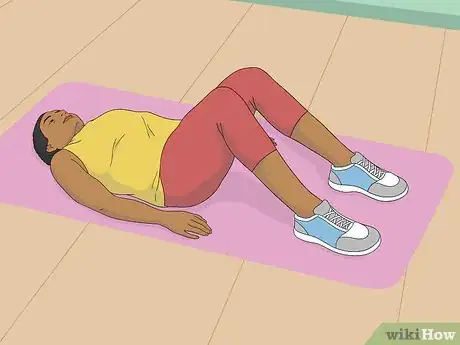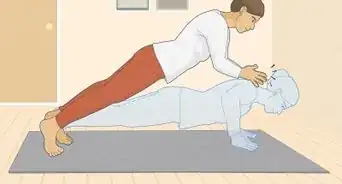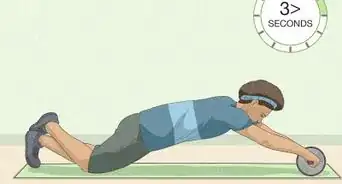This article was co-authored by Tiffany Stafford, CPT. Tiffany Stafford is a Certified Personal Trainer, Holistic Nutritionist, and the Owner of LifeBODY Fitness, a personal training and small group training studio based in Hillsboro, Oregon. She has over 15 years of personal training and coaching experience. She specializes in wellness training, life coaching, and holistic nutrition teaching. She earned her personal training certification from the National Academy of Sports Medicine (NASM).
This article has been viewed 293,500 times.
To pass the Army physical fitness test, men and women must be able to perform 53 sit ups; 72 to achieve an "excellent" rating. A sit up is disqualified if it's not executed using the proper form. See Step 1 and beyond to learn how to do sit ups according to the high standards of the US military.
Steps
Performing a Sit Up
-
1Lie with your back on the floor and your knees slightly bent. Get on a completely flat surface either on an exercise mat or outside on the grass. Your feet should be flat on the ground, separated by no more than 12 inches (30.5 cm).[1]
- During the military test, someone will hold your feet or ankles in position. Get a partner to hold your feet in order to simulate the actual test.
- The heel is the only part of your foot that must maintain contact with the ground. You can raise up your toes if you want.[2]
-
2Interlock your hands behind your head. In the proper position for military sit-ups, you must keep your hands interlocked behind your head throughout the entire exercise.[3]Advertisement
-
3Raise your torso to a vertical position. Use your abdominal muscles to lift your body until the base of your neck is above the base of your spine. Stop when the bend in your hips is at a 90˚ angle.
- Do not arch your back. It should remain straight.
- Do not raise your buttocks off the ground to raise your body.
- Do not let your knees exceed a 90-degree angle.[4]
-
4Lower your back until your shoulder blades touch the ground. Use a steady motion; Do not let yourself bounce back up, and do not rest when you reach starting position.
-
5Repeat. Use the exact same motion and do at least 53 sit ups. If you rest on the ground, you'll have to start over completely. Any single rep can be disqualified from your final count if you do the following:
- Fail to lift your upper body to a vertical position
- Bow your back
- Exceed 90 degrees with your knees
- Fail to keep your fingers locked behind your head
- Raise your buttocks off the ground.
Passing the Sit Up Test
-
1Complete the correct number of reps. To pass this portion of the fitness test, do at least 53 sit up repetitions per set if you are between 17 and 21 years old.[5] If you're between 22 and 26, do at least 43 reps.
-
2Train by doing more sets than required. When you train, simply continue the exercise until muscle failure occurs. Repeat until you've completed 4 sets. There should be no more than one minute of rest between each set.
-
3Train several times a week. In order to start seeing/feeling results, aim to do four sets three days a week for six weeks. For faster results, increase the number of sets/times per week you do this exercise.
-
4Work toward excellence. If you're able to make it to 72 perfect sit ups, you'll receive a score of 90 points and a rating of "excellent" for this exercise. If you're good at sit ups, work your hardest to receive the highest rating you can achieve.
Expert Q&A
-
QuestionHow can I improve my military sit ups?
 Tiffany Stafford, CPTTiffany Stafford is a Certified Personal Trainer, Holistic Nutritionist, and the Owner of LifeBODY Fitness, a personal training and small group training studio based in Hillsboro, Oregon. She has over 15 years of personal training and coaching experience. She specializes in wellness training, life coaching, and holistic nutrition teaching. She earned her personal training certification from the National Academy of Sports Medicine (NASM).
Tiffany Stafford, CPTTiffany Stafford is a Certified Personal Trainer, Holistic Nutritionist, and the Owner of LifeBODY Fitness, a personal training and small group training studio based in Hillsboro, Oregon. She has over 15 years of personal training and coaching experience. She specializes in wellness training, life coaching, and holistic nutrition teaching. She earned her personal training certification from the National Academy of Sports Medicine (NASM).
Life Coach, Personal Trainer, & Holistic Nutritionist Try doing sit ups on a stability ball to work your side muscles and make doing regular sit ups easier. Also, be careful not to arch your back too far, or it could pinch nerves in your lower spine and cause pain.
Try doing sit ups on a stability ball to work your side muscles and make doing regular sit ups easier. Also, be careful not to arch your back too far, or it could pinch nerves in your lower spine and cause pain.
Warnings
- Injuries to your back and neck may be incurred if this exercise is performed incorrectly.⧼thumbs_response⧽
- Don't use your arms to pull your head. This can cause neck injuries. Your hands should rest on the back of your head without pulling.⧼thumbs_response⧽
- Note that the U.S. military is putting less emphasis on the sit up in modern training. Sit ups are losing favor because they can be hard on the spine and may strengthen the core less effectively than planks and other isometric exercises.[6]⧼thumbs_response⧽
Things You'll Need
- Exercise mat (optional)
- Partner to hold your feet
References
- ↑ https://www.military.com/military-fitness/fitness-test-prep/proper-technique-for-curl-ups
- ↑ https://www.military.com/military-fitness/fitness-test-prep/proper-technique-for-curl-ups
- ↑ https://youtu.be/q8x3c5nTaag?t=29
- ↑ https://www.military.com/military-fitness/fitness-test-prep/proper-technique-for-curl-ups
- ↑ https://www.military.com/military-fitness/fitness-test-prep/proper-technique-for-curl-ups
- ↑ https://www.issaonline.edu/blog/index.cfm/2016/are-sit-ups-bad-for-you-the-us-military-seems-to-think-so
























































